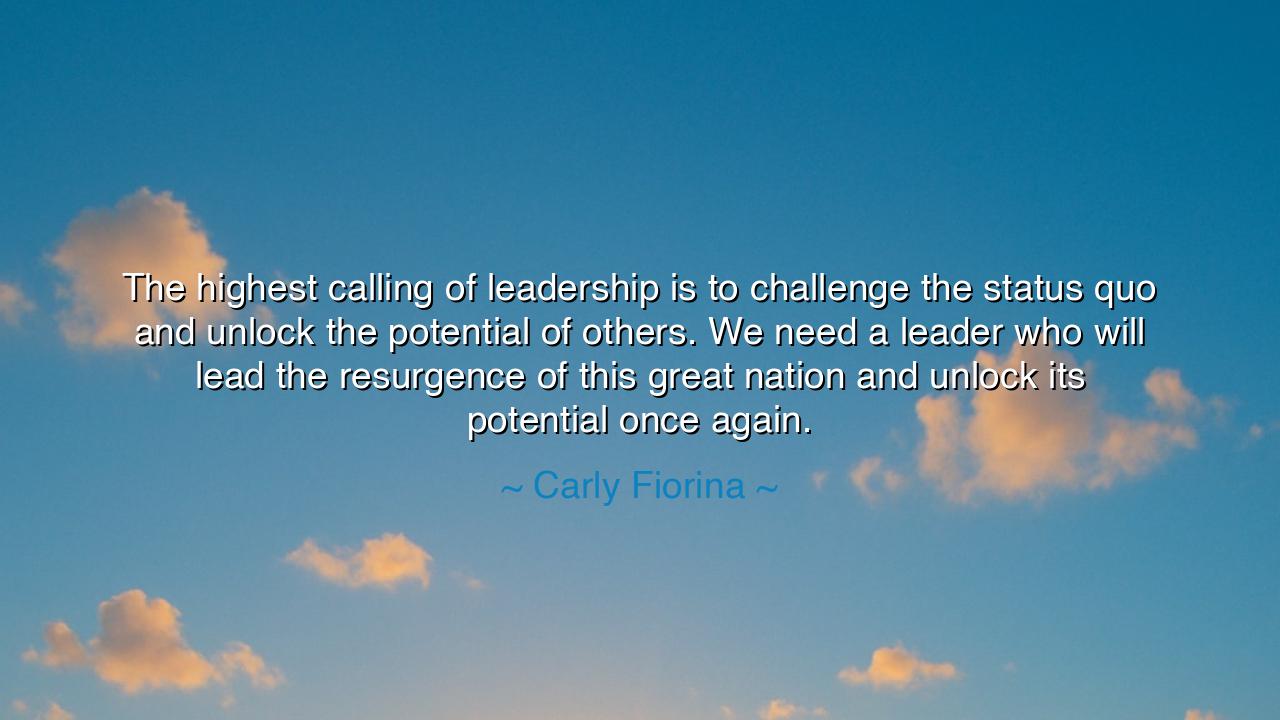
The highest calling of leadership is to challenge the status quo
The highest calling of leadership is to challenge the status quo and unlock the potential of others. We need a leader who will lead the resurgence of this great nation and unlock its potential once again.






When Carly Fiorina declared, “The highest calling of leadership is to challenge the status quo and unlock the potential of others. We need a leader who will lead the resurgence of this great nation and unlock its potential once again,” she spoke not only to the politics of her time but to the timeless essence of true leadership. Her words rise like a clarion call — urging those who lead to become not masters of power, but servants of possibility. For in every age, the world falls into the comfort of habit, into the quiet decay of complacency. And in every age, it is the true leader — the one who dares to question, to inspire, to awaken the dormant greatness of others — who rekindles the flame of renewal.
The origin of this quote rests in Fiorina’s reflections on leadership, drawn from her years at the helm of major enterprises and her foray into public life. As a businesswoman who rose from humble beginnings to lead Hewlett-Packard, she understood that the essence of leadership lies not in preserving systems, but in transforming them. Her words reflect both personal conviction and civic vision — that the destiny of a nation, like that of an organization, depends not on the few at the top, but on the awakening of the many. For leadership, in its highest form, is not the accumulation of authority; it is the art of elevation — the ability to see greatness in others and summon it forth.
The ancients would have understood this truth well. For even Socrates, the philosopher who taught in the open air of Athens, led not through command but through questioning — by challenging assumptions and stirring the minds of others to think deeply. In this way, he did not impose wisdom; he unlocked it. The same principle guided Moses, who led his people not merely from Egypt’s chains, but from the bondage of despair. His greatness was not in his miracles, but in his courage to confront the unmovable — to challenge the status quo of both Pharaoh’s tyranny and his own people’s fear. Such leaders remind us that the mark of true leadership is not to preserve comfort, but to ignite change born of conviction.
To challenge the status quo is to stand against inertia — that subtle force that binds societies and souls alike to the familiar. It demands both vision and sacrifice, for to question what is accepted is to invite resistance. History’s greatest leaders have borne this burden. Consider Abraham Lincoln, who in a time of national fracture dared to redefine freedom itself. His leadership did not arise from convenience but from conscience, from his unwillingness to let moral decay disguise itself as stability. In unlocking the potential of a divided people, he revealed that leadership’s truest test lies not in maintaining order, but in calling a nation toward its better self.
Fiorina’s words also speak to a more intimate truth — that leadership is not confined to politics or power, but belongs to all who influence others. Every parent, teacher, mentor, and friend carries the same sacred duty: to see potential where others see limitation, to call forth courage where fear has taken root. The leader’s heart must be both firm and compassionate — firm enough to disrupt what is stagnant, compassionate enough to nurture what is fragile. For to challenge without love is tyranny, but to love without challenge is weakness. The balance between the two is the soul of leadership.
There is also in her message an echo of hope — that even in times of decline, renewal is possible. A nation, like a person, can forget its greatness. It can drift into cynicism, content with mediocrity. But the resurgence Fiorina speaks of is not mere revival of strength; it is the rediscovery of purpose. The leader she envisions is one who reminds the people of what they are capable of, who rekindles unity through shared aspiration, who transforms despair into drive. Such leadership does not dwell in slogans, but in service — for to unlock a nation’s potential, one must first believe in its worth.
So, my listener, take this wisdom into your own life. Whether you command armies or guide a single soul, remember that the highest calling of leadership is not to rule, but to awaken. Do not fear to question what is unjust or stagnant, for every act of renewal begins with one voice that dares to say, “This can be better.” Seek not followers, but partners; seek not praise, but purpose. Build others, for in building them, you build yourself.
For in the end, as Fiorina reminds us, leadership is not a title, but a torch — passed from hand to hand, from heart to heart. Its flame burns brightest in those who lead not for power, but for progress; not for recognition, but for transformation. Challenge the status quo, yes — but do so with love, and lead others toward the greatness that already sleeps within them. For when a leader awakens the spirit of a people, that spirit, once stirred, can move mountains, restore nations, and light the path for generations yet unborn.






AAdministratorAdministrator
Welcome, honored guests. Please leave a comment, we will respond soon